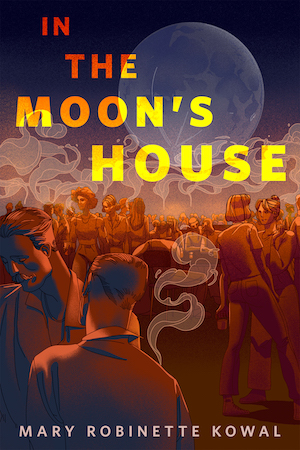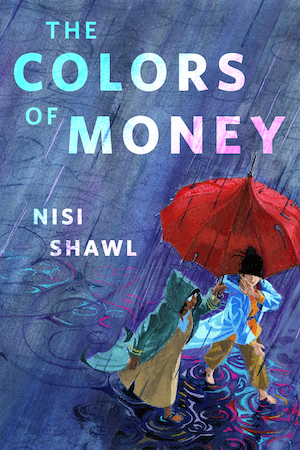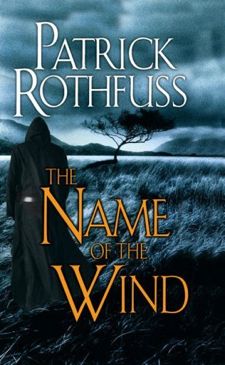Welcome to part 8 of my excessively detailed re-read of Patrick Rothfuss’s Kingkiller Chronicles. This week’s post covers chapters 43-50 of The Name of the Wind, but also contains spoilers for the whole book and the whole of The Wise Man’s Fear—these discussions assume you’ve read all of both books. There’s absolutely no point in going beyond the cut unless you have. But don’t worry if you haven’t, you can catch up.
Abbreviations: NW = The Name of the Wind. WMF = The Wise Man’s Fear. DT = Day Three, the forthcoming final volume. K = Kvothe or Kote when I can’t figure out what to call him and I’m feeling Kafkaesque. MT: Myr Tariniel.
Useful links: The Sleeping Under the Wagon post, in which there are lots of theories. The re-read index. The map.
So, Chapter Forty-Three, The Flickering Way. This is the terrible chapter where Kvothe gets banned from the Archives. I can hardly bear to read it—and yet I read the troupe murder chapter quite calmly.
Ambrose is harassing Fela, Kvothe wants to defend her because she looks guilty and ashamed for not being able to stop him. He says it reminds him of things he saw on the streets of Tarbean.
Ambrose addressed Kvothe as “E’Lir,” meaning he knows that he’s been admitted to the Arcanum. Admittedly, probably everybody knows.
“So same the humble thrush well knows its north” really is terrible poetry. Rothfuss is wonderful. It’s incredibly hard to do the things bad poetry does on purpose.
Kvothe attacks Ambrose for appalling poetry and sexual harassment, both of which he is actually guilty of. And at their last meeting Ambrose was really scornful and condescending. But going head on at him like this really is a bit excessive. Of course, the nahlrout is wearing off, and with it Kvothe’s judgement.
So Fela leaves, and Ambrose fleeces Kvothe a talent for the “stack fee” and then tricks him about the lamp and the candle. He goes into the stacks and even though the nahlrout is wearing off leaving him in pain he has a perfectly normal reaction to being in a library, surrounded by books—he feels happy and safe. The Archives are seven stories tall and also extend underground. He wonders how the air is sweet. So do I. He wanders around and finds the Four Plate door.
The Four Plate door is locked, and it has a lock, four keyholes, in the four copper plates. I’m convinced it’s hugely significant. There could be anything behind it, from losers in the Creation War to part of the moon—though I think that’s in the Lackless box. Kvothe compares it, significantly, to a greystone, and says it’s a door for staying closed, not a door for opening.
It says on it “Valaritas” which is definitely Tema, it’s absolutely formed as a Latin words, and it’s a noun form that describes the quality of something—a word that in English would end in -ness, or -itude. Romanitas is the quality of being Roman, dignitas is worthiness, vanitas is vanity. Valaritas means “possessing the quality of valar” whatever “valar” is, it reminds me of valour, and vlor in Anathem, and obviously the Valar in the Silmarillion. Come on, you scholars of imaginary languages, help me out here!
And then a scriv finds him, and he is taken to Lorren. Ambrose acts innocent, and Kvothe is banned from the Archives, And here we have the proverb about what wise men fear for the first time, with the anger of a quiet man very much applied to Lorren. (Who is totally an Amyr.) He says he doesn’t care for intentions, only actions.
Then Kvothe goes back to his friends, realising he has traded access to information for nothing but reputation. And they tell him there’s no stack fee, and he swears vengeance on Ambrose, whereupon they sensibly tell him to leave Ambrose alone—he’s high born, malicious, and powerful. Ambrose is that noble’s son who is a force of nature to be avoided, but Kvothe won’t avoid him. This is where we hear about his claim to the throne, too:
“Actually he’s sixteenth in the peerage,” Sim said, matter of factly. “You’ve got the royal family, the princes regent, Maer Alveron, Duchess Samista, Aculeus and Meluan Lackless…”
We don’t know, of course, how far through that sixteen Sim got before being shut up. We don’t know how many are in the royal family, or how many princes regent there may be. (In our world, “royal family” is a Victorian term and denotes a change in attitude to a power-stripped constitutional monarchy.) It’s also odd that there are multiple prince regents, unless it’s a term that means something like “elector” rather than meaning what prince regent means in our world—you only need a regent when the king or queen is incapable for reasons of age or incapacity. I suppose they could have a twelve year old king and his younger siblings, a number of regent brothers of his dead father, and then the others. I know nothing about Samista, but a lot about Maer Alveron and the Lacklesses.
Chapter Forty-Four is The Burning Glass. Kvothe goes to the Fishery, “Artificiery” and Kilvin shows him his attempts at ever-burning globes. I love the way this is done. Most fantasy is very bad at dealing with the way historical magic became science, but Rothfuss goes right at it with “I do not hope” and the mixture of magic and science at the Fishery, using sygaldry to make tech. It’s brilliant. And then in Ankers, first mention of this inn which will be so significant, Willem and Sovoy and Sim talk to Kvothe about finding a master to help him become Re’lar. He’s alienated Lorren, Hemme, and Brandeur, Medica is too slow, he knows no Alchemy, Kilvin is the obvious one, but he wants Elodin, he wants Names and real magic. Skarpi “hadn’t mentioned Arcanists, only Namers.” And the chapter ends with a repetition of his desire to find the name of the wind.
Chapter Forty-Five is Interlude: Some Tavern Tale. And we’re back in the frame, after a long time out of it, and it gave me whiplash. Why are we pulling back here? There isn’t strong emotion as there has been the other times. Just a moment to tell us that this is a told story and to stop us being too settled in Kvothe’s head? Or setting up something for the next bit?
Chronicler is writing, and Kvothe reflects on how these are the first stories ever told about him, and Chronicler says they’re still telling them at the University. This implies only that Chronicler has visited the University since. Bast asks why he didn’t look for Skarpi. Kvothe says because he wasn’t living in a story but in real life. The most interesting thing he says is that he made enemies at the University “more dangerous to me than any of the Chandrian.” That’s an interesting way of putting it: “any of the Chandrian.” As if he’s thinking of them separately. And enemies plural, not just Ambrose, Hemme as well perhaps? And more dangerous, really? If the Chandrian’s plan is to end existence itself?
But I like the idea that he had other things in his mind as well as revenge, and that revenge was more difficult than you’d think.
He says in the standard pattern of story he’d learn naming from a mad hermit in the woods, and then says he nearly had a mad hermit—meaning Elodin. And again, the chapter closes with his desire to learn the name of the wind. Setting us up. Right then.
Chapter Forty-Six is The Ever Changing Wind. Kvothe hassles Elodin and gets taken to the Crockery, the insane asylum maintained by the University for people driven mad by what they’re learning. He shows him Alder Whin, a giller driven mad, and the room where Elodin spent two years before escaping. The woman on the desk says they’re all especially mad at the moment because the moon is full. I took this as being one of those things—the word “lunatic” means somebody driven mad by the moon, after all. But it isn’t, they’re literally madder because the two worlds are closer and they could fall through.
Kvothe is treating the whole thing as if he’s in a story, and Elodin does too. He gives Kvothe three questions, and Kvothe is careful with them. He describes himself in the terms of the Taborlin story—locked up in a tower without coin, key, or candle. Then he breaks the wall by saying “break” to it, or what Kvothe hears as “break,” and then “Cyaerbasalien.” That’s Faen. I can tell the linguistic similarity. Kvothe is deeply impressed.
Then Elodin tells him to jump off a roof and Kvothe succumbs to peer pressure and jumps off, breaking some ribs and dislocating his shoulder. And after that he didn’t want to study with Elodin so much, so he became an Artificer.
The way this chapter is written, and after the jump to the frame just before it to contrast, it points up the contrast between the “story” expectations and the “real” ones, which is a fairly brave thing to do in the middle of a novel. And we are in the middle—there are ninety-two chapters, so we are at the half-way point.
Chapter Forty-Seven is Barbs. The first line made me laugh: “Apart from its rocky start, my first term went fairly smoothly.” It’s a synopsis of the term—cheating at cards to make money, artificing to make money, learning artificing and medicine, practicing Siaru with Wil. He also mentions spreading rumours about himself to get the benefit of his reputation. And he’s good friends with Wil and Sim and enemies with Ambrose. He doesn’t describe the individual instances of Ambrose insulting him and Kvothe turning the insult back and making Ambrose more angry, just says they happened. And he says he saw Ambrose as a puffed up clown and couldn’t imagine what harm he could do; he wasn’t brave, he was a fool.
Chapter Forty-Eight is Interlude: A silence of a different kind. Back to the frame, after only two chapters of story. And we’re in Bast’s head, and we learn that until a year ago Bast was afraid of nothing, but now he is afraid of silence. Presumably, the silence with which the book begins and ends, K’s silence, which is a presence and not an absence. He is afraid it is gathering when K is quiet for seventeen counted breaths—less than twenty seconds. And then Kvothe says he doesn’t know how to tell the next bit of story, and they have a quick meal break. (Somebody said the audiobook of NW is forty something hours, but it does feel plausibly like a day to me.)
And then Kvothe takes another run up at beginning—he says the story is lacking something, and Bast says “women” and he says “a woman.” And she is in the wings. But we have met Denna already, and without warning like this. We’re not going to get to her again this week anyway.
Kvothe says, in saying how hard it is to describe her—and he still hasn’t named her, in the frame—that he once sang colours for a blind man. That must have been a major act of Naming, don’t you think?
Chapter Forty-Nine is The Nature of Wild Things. He starts off my saying that you have to sneak up on wild things, and so he’s sneaking up on talking about her. And at first it’s nothing about her. The end of the term, Admissions, and he’s given a tuition of three and a bit talents. He almost has it, but he doesn’t want to borrow from a friend, and anyway he needs another talent for a bed in Mews. He tries a respectable moneylender and has no luck, so he goes to find one of the unrespectable kind, a gaelet, across the river, in Imre.
Chapter Fifty is Negotiations. It begins with a description of Imre, a town of the arts, benefitting from the University for sympathy lamps and good glass, near enough to Tarbean for commerce but not near enough for the smell. It goes on to say that Kvothe avoided Imre because hearing music without being able to participate was like having an addiction dangled in front of him—he describes a denner addict in Tarbean. All these denner mentions are setting us up for the addicted draccus, of course. He goes to Imre to find Devi, a gaelet who will lend to anyone.
So we’re expecting a desperate man, and instead we find a girl. Not the “she” he was warning us to expect, however.
I like Devi. She’s a dark shadow of Kvothe in some ways—a powerful sympathist thrown out of the University and going her own way, lending money to get power. In just the way he was saying Elodin was like a mad hermit in stories, Devi isn’t at all like people in stories. And she’s an independent woman who has taken her own path that isn’t any of the choices Denna lays out in the Bechdel scene in WMF. Gaelet isn’t perhaps the best or safest career, but it’s got nothing to do with sex.
Devi offers him four talents at 50% interest, and he has to give some blood as collateral so that she can find him. He refuses, then goes out and buys a lute and goes back and borrows the money. He doesn’t buy the lute for sensible reasons like making money playing it—though he does that later—he buys it because he’s addicted to music. He was at the point of borrowing the jots he needed from a friend and sleeping rough instead of taking the risk of giving his blood to Devi, but it was music made him do it.
And that’s where we’ll stop, to start next week with the second term, leaving the possibility of Denna hanging like fragrance in the air.
Last weeks comments were awesome.
Ryanreich and others dissected Kvothe’s answer about triangles, which was actually wrong, but has been corrected in later editions.
BAM and TyranAmiros think that Lorren is an Amyr. So do I.
The Department of Imaginary Linguistics is promoting to E’lir Shalter, Ellynne, Susan Loyal, Thistlepong, C12VT, and Haleyal for the detailed analysis of the phrase “Vorfelen Rhinata Morie.”
And Shalter gets this week’s strawberry wine (to be delivered by tinker) for finding Wil saying in WMF that it means “something like” “the desire for knowledge shapes a man” and proposes that it might actually mean “With knowledge a man can Shape.” I really, really like this.
Lacklesses, again.
It struck me that a lith means a standing stone, so perhaps the Lacliths are lacking a stone, the Lack-keys have no key, and all the things in the rhyme are listed in the names of the different branches of the family. Shalter suggested they might have (or be lacking) one thing each. Artful Magpie suggests that the “ring that’s not for wearing” could be the ring of greystones at Faeriniel, and that Faeriniel itself could be the “road that’s not for travelling.”
More generally on names, Chrispin suggested that from the meaning of the runes, “Tehlu” could mean Lockless. And Artful Magpie pointed out that what Kvothe does to the dragon is similar to what Tehlu does to Encanis.
And from looking at the runes, Thistlepong notices that Fehr=iron and Ule=binding, so Ferule or Ferula as Cinder’s real name could mean bound iron.
Jo Walton is a science fiction and fantasy writer. She’s published two poetry collections and nine novels, most recently Among Others, and if you liked this post you will like it. She reads a lot, and blogs about it here regularly. She comes from Wales but lives in Montreal where the food and books are more varied.










